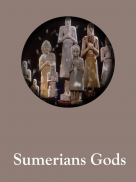





Sumerians gods

Description of Sumerians gods
Sumerian religion was the religion practiced and adhered to by the people of Sumer, the first literate civilization of ancient Mesopotamia. The Sumerians regarded their divinities as responsible for all matters pertaining to the natural and social orders.
Before the beginning of kingship in Sumer, the city-states were effectively ruled by theocratic priests and religious officials. Later, this role was supplanted by kings, but priests continued to exert great influence on Sumerian society. In early times, Sumerian temples were simple, one-room structures, sometimes built on elevated platforms. Towards the end of Sumerian civilization, these temples developed into ziggurats--tall, pyramidal structures with sanctuaries at the tops.
Sumerian religion heavily influenced the religious beliefs of later Mesopotamian peoples; elements of it are retained in the mythologies and religions of the Hurrians, Akkadians, Babylonians, Assyrians, and other Middle Eastern culture groups. Scholars of comparative mythology have noticed many parallels between the stories of the ancient Sumerians and those recorded in the early parts of the Hebrew Bible.
Many stories in Sumerian religion appear homologous to stories in other Middle Eastern religions. For example, the biblical idea of man's creation and the flood of Noah, are closely linked to the Sumerians tales. The gods and goddesses from Sumer have similar representations in the religions of the Akkadians, Canaanites and others. Similarly, a number of stories related to deities have Greek parallels; for example, Inanna's descent into the underworld is impressively connected to the myth of Persephone.

























